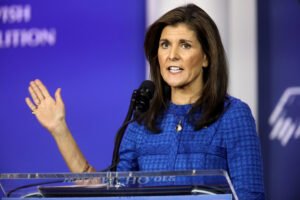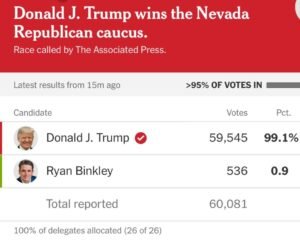After winning the Republican caucus in Nevada, former President Donald Trump moved one step closer to winning the party’s candidature by collecting all 26 delegates on Thursday. Trump took advantage of his strong support from the general public, which was especially strong in the state’s caucus system, since he had no serious rivals to contend with in the Nevada caucuses. His bid for the candidature gained momentum after this victory; he now needs 1,215 delegates to formally secure the nomination, which he may do by March.
Haley’s Allegations and Strategy
A potential Republican nominee, former U.N. ambassador Nikki Haley, declined to enter the Nevada caucuses, alleging an unfair process that she believed favoured Trump. She chose to run in the state-run presidential primary in the state instead, which is symbolic, but she lost to the “none of these candidates” option.

It was hardly surprising that Trump dominated Nevada, considering that the state’s Republican base still loves him. The state party responded to concerns about the process’s fairness by enacting regulations that forbade candidates from participating in both the primary and the caucuses and limited the power of super PACs. Trump’s fans showed their steadfast support for the former president by enduring long lineups at caucus sites despite these precautions.
Contrasting Election Systems and Voter Regulations
The Nevada caucuses brought to light the distinction between election systems, which provide greater flexibility through alternatives like early or absentee voting, and caucus systems, which necessitate in-person participation at certain times. Republicans in Nevada stressed the necessity of a few regulations, like requiring participants to provide official identification.

Trump’s Dominance with Nevada and Presidential Aspirations
With his win in Nevada, Trump is now well-positioned for his next contests, most notably the South Carolina primary on February 24. Haley intends to take advantage of a home-state edge even if Trump is still well-liked in South Carolina, a state known for its conservatism, by using her two terms as governor. In the Super Tuesday contests on March 5, Trump is hoping to pick up a sizable number of delegates, which would further cement his position as the presumed nominee of the Republican Party.

Even after Trump’s victory, scandals involving prominent members of the state’s Republican Party cast a shadow. Party Chair Michael McDonald and other well-known Republicans were charged with felonies for fabricating evidence of Trump’s electoral victory in Nevada in 2020.
All things considered, Trump’s triumph in the Republican primary in Nevada highlights his ongoing hegemony inside the party and his resolve to win the nomination for the next presidential contest.











Comments 1